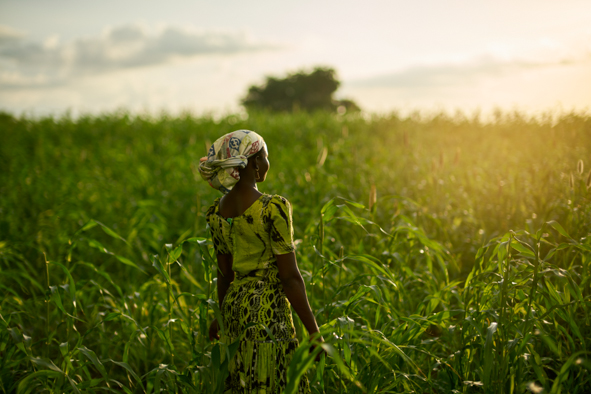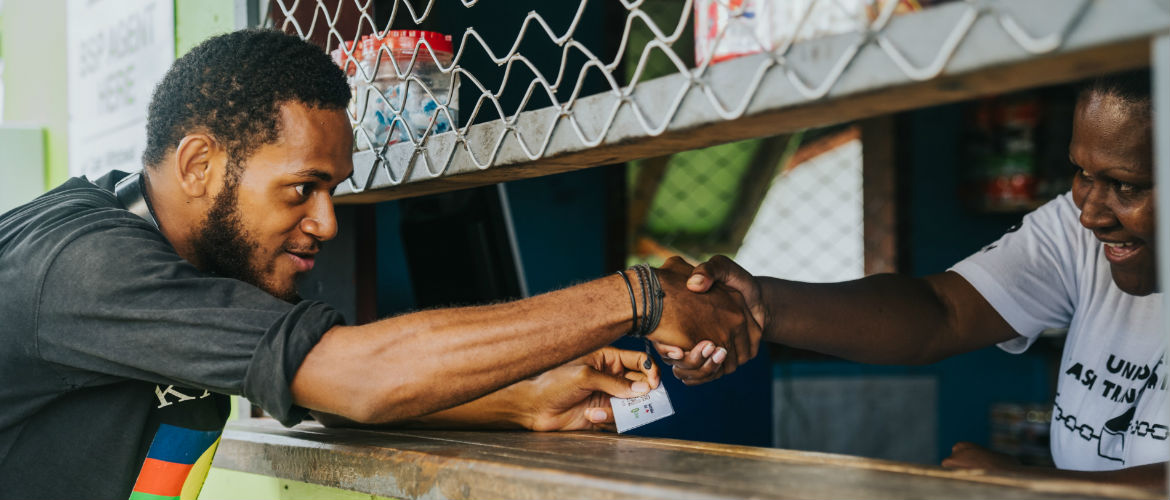Iconic artwork by graffiti artist Banksy has come to life to support an Oxfam campaign to regulate the weapons trade which kills one person every minute.
News photographer Nick Stern, who has seen first-hand the devastating effect of armed violence, has recreated two of the artists’ famous works using real life lookalikes in support of the charity – as world leaders meet for crunch talks to regulate the deadly arms trade.
More regulations on bananas than guns
The first depicts a scene from Quentin Tarantino’s Pulp Fiction, with Samuel L Jackson and John Travolta clutching bananas instead of guns. Sprayed on a wall near Old Street Tube in East London, it was one of the most famous graffiti paintings by the artist and estimated to be worth more than $450,000 when it was painted over by Transport for London. The second is of a child soldier that appeared on a shop in the US, in Westwood, LA.
Both have come back to life to illustrate the shocking facts there are more regulations on the banana trade than the gun trade and there are around 300,000 child soldiers.
Every day, up to 2,000 people around the world die as a result of armed violence and each year enough bullets are produced to kill every person on the planet twice.
Oxfam calls for a strong Treaty
As leaders from 193 countries at a UN conference in New York (2–27 July) negotiate an Arms Trade Treaty, Oxfam is calling for a strong treaty that would be based on a simple principle: no transfers of weapons when there is a substantial risk that they may be used for serious violations of international human rights or humanitarian law. It also says all arms, including ammunition and components, must be included in the treaty.
Mr Stern, who splits his time between the US and UK, said: “As a photographer I’ve seen the misery armed conflict causes, in Africa, Asia and Eastern Europe. I wholeheartedly support a treaty that can save thousands from the horrors of armed violence and conflict.
“In recent years we’ve seen thousands of news images of more and more women, children and civilians whose lives have been ended or ripped apart by armed conflict.
“War is no longer the preserve of well trained, tactical military personnel, it has spread into every area of society. The people taking up arms are farmers, engineers, builders and students, and lives are being blighted or ended.
“The ease at which ordinary people can obtain weapons is adding to this misery. This Arms Trade Treaty can make a real difference, it’s not the politics or the economics that’s important, it’s the lives of thousands of people each day that matter.”
Syria imported millions worth of arms in 2010
Oxfam’s recent report, The Devil is in the Detail, shows how the lack of robust and legally binding obligations on the sale and transfers of arms has allowed the ongoing flow of weapons into Syria. In 2010, for example, Syria imported $167 million worth of air defence systems and missiles as well as $1 million worth of small arms and light weapons, ammunition and munitions. Some of these arms have played a central role in the Syrian government’s crackdown on protesters in which the United Nations estimates 8,000 people have been killed this year and last.
The unregulated international arms trade is a dangerous business, and for too long the steady flow of arms around the world has been largely ignored. The irresponsible arms trade fuels serious human rights abuses, armed violence, poverty and conflict around the world. This could change with a comprehensive, robust treaty, a bulletproof Arms Trade Treaty.
A robust Arms Trade Treaty would turn off the tap. It would place stronger controls on the international movement of all arms and ammunition. This will help stop the flow of arms and ammunition into communities in conflict already awash with weapons, and give the people a fighting chance of retaking their communities from the claws of violence and fear.


 Doris*, daughter, 5; Pamila*, 2. Christina grows maize and she was shown how to make compost as part of the CRAFS (Climate Resilient Agriculture and Food Systems) programme.
Doris*, daughter, 5; Pamila*, 2. Christina grows maize and she was shown how to make compost as part of the CRAFS (Climate Resilient Agriculture and Food Systems) programme.
